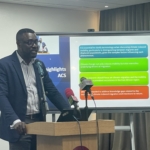
The National Project Officer of the International Organisation for Migration (IOM) Ghana, Eric Kwame Akomani, has appealed to the government to prioritise informal settlements in infrastructure planning by recognising the needs and realities of these communities.
He said these settlements are often characterised by inadequate access to basic services such as water, sanitation, and electricity, which pose unique challenges for infrastructure planning.
“By prioritising informal settlements in infrastructure planning, policymakers and planners can help address the unique challenges and the needs of these communities, promoting more inclusive, equitable, and sustainable development,” he added.
Mr Akomani made these suggestions during a presentation on Human Mobility in the Context of Climate Change Within the Accra Metropolitan Assembly (AMA), a follow-up to the Africa Climate Summit II.
IOM, together with city officials from Accra, Addis Ababa, and Bujumbura, participated in the African Climate Summit II in Addis Ababa, where they hosted a side event on “Assessing the Impacts of Climate-Induced Mobility on Cities in Africa.”
As a follow-up from the side event to sustain national momentum, IOM Ghana and the Accra Metropolitan Assembly (AMA) held a media briefing to share key highlights of the findings of the research conducted on the interlinkages between human mobility and climate change.
Mr Akomani called for the development of a funding strategy to ensure allocation of resources and funding for the implementation of climate change and human mobility-related adaptation actions.
Also, investments in local data systems tracked displacement and the collection of sex- and age-disaggregated data to ensure that mobile and displaced populations were counted, represented, and supported in real-time decision-making.
“Accra’s future depends on how it manages risk, mobility, and equity. The convergence of climate change, internal migration, and gender inequality in AMA is a critical policy frontier,” he added.
Mr Akomani said they needed to provide early warning systems and early identification of persons exposed, as well as develop a gender-sensitive and transparent monitoring system.
He urged the AMA to develop a Climate Mobility Tracker that captured intra-urban movement, seasonal displacement, and gendered vulnerabilities.




